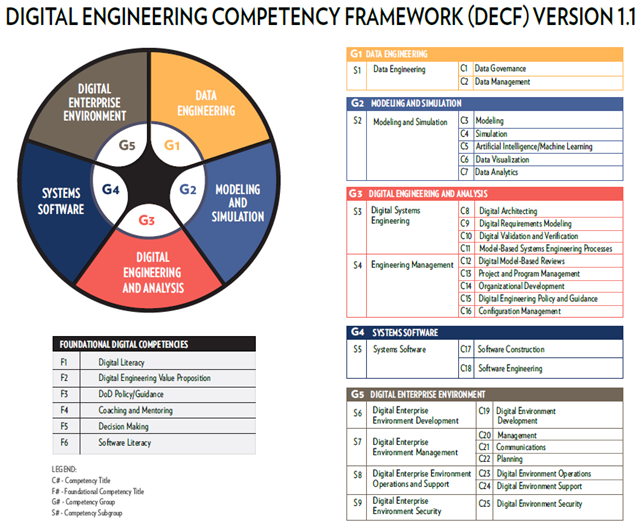The Systems Engineering Research Center (SERC) has been tasked by the Office of the Under Secretary of Defense for Research and Engineering (OUSD (R&E)) to create a Digital Engineering Competency Framework (DECF). As the Department of Defense (DoD) transitions to digital engineering (DE), there is a need to develop and maintain an acquisition workforce and culture that is literate in model-based engineering, competent in digital engineering models, methods, tools, and understands digital artifacts across the acquisition lifecycle.
DE is “an integrated digital approach that uses authoritative sources of systems’ data and models as a continuum across disciplines to support lifecycle activities from concept through disposal. A DE ecosystem is an interconnected infrastructure, environment, and methodology that enables the exchange of digital artifacts from an authoritative source of truth.” DE is a critical practice necessary to support acquisition in an environment of increasing global challenges, dynamic threats, rapidly evolving technologies, and increasing life expectancy of our systems currently in operation.
Digital transformation is fundamentally changing the way acquisition and engineering are performed across a wide range of government agencies, industries, and academia and is characterized by the integration of digital technology into all areas of a business, changing fundamental operations and how results are delivered in terms of new value to customers. It includes cultural change centered on alignment across leadership, strategy, customers, operations, and workforce evolution.
The purpose of the DECF is to provide clear guidance for the DoD acquisition workforce, in particular the engineering (ENG) acquisition workforce, through clearly defined competencies that illuminate the knowledge, skills, abilities, and behaviors (KSABs) required for digital engineering professionals. Though the DECF includes considerations specific to the Defense acquisition workforce, data was gathered from outside the defense community and the structure of the DECF provides a useful model for any individual or organization that needs to understand the skills required to successfully implement DE.
Phase 2 of this research task focused on mapping existing DoD DE training resources against the DECF to identify gaps and provide recommendations on how to build the digital engineering competency of the DoD workforce. The current Defense Acquisition University (DAU) ENG curriculum was analyzed against the DECF to:
- Identify which competencies are already covered within the existing curriculum;
- Identify clear gaps between the existing curriculum and the DECF; and
- Create specific recommendations for training that could help address DECF competencies that are not currently covered in the curriculum.
The updated DECF v. 1.1 includes new competencies that were discovered from the gaps identified when comparing the DECF with the DoD training resources. The DECF competency groups were also updated to reflect a cohesive categorization of the competencies. In DECF v. 1.1, there are five (5) competency groups, nine (9) competency subgroups, and 31 competencies (including six (6) foundational digital competencies) identified as shown in Figure 1.

Please click to learn more about DECF v. 1.1.
CONTACT
Principal Investigator: Dr. Nicole Hutchison, Stevens Institute of Technology
